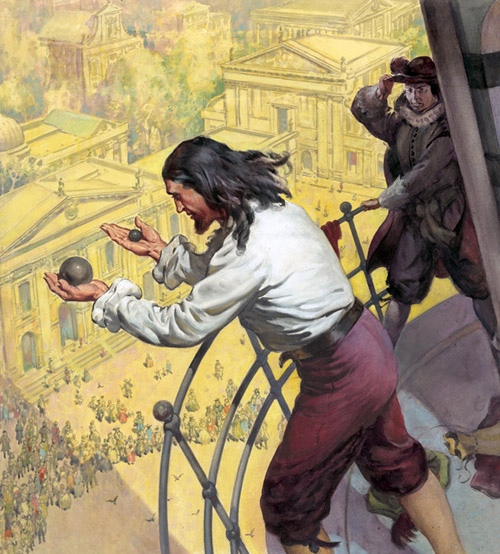 Galileo Galilei was born in Italy in 1564. He was a physicist, mathematician, astronomer, and philosopher, whose thinking and discoveries laid very important foundations for our modern world.
We can hardly imagine someone believing that the earth is the center of the universe, but Galileo lived in a time of huge controversy over exactly that question. The reigning political and ecclesiastical authorities believed that the universe revolved around the earth – after all, that’s what you see every day, right? – and were willing to give anyone who thought differently a rough time, as Galileo and others found out.
Do you remember the story of Galileo carrying out experiments on gravity from the leaning tower of Pisa? Although this may never have happened, one old version of the story relates the reaction of the authorities:
“This meddlesome man Galileo must be suppressed,” murmured the University fathers as they left the square. “Does he think that by showing us that a heavy and a light ball fall to the ground together he can shake our belief in the philosophy which teaches that a ball weighing one hundred pounds would fall one hundred times faster than one weighing a single pound? Such disregard of authority is dangerous and we will see that it goes no further.”
Galileo is also known for inventing the telescope.
Actually, he did not invent the telescope. He improved it.
In the spring of 1609 he heard that in the Netherlands – ahh those Dutch are always showing up, aren’t they? – an instrument had been invented that showed distant things as though they were nearby.
By trial and error, he quickly figured out the secret of the invention and made his own three-powered spyglass from lenses for sale in spectacle makers’ shops.
Others had done the same; what set Galileo apart was that he quickly figured out how to improve the instrument, taught himself the art of lens grinding, and produced increasingly powerful telescopes.
In the fall of 1609 he began observing the heavens with instruments that magnified up to 20 times. With his telescope he saw for the first time:
Galileo Galilei was born in Italy in 1564. He was a physicist, mathematician, astronomer, and philosopher, whose thinking and discoveries laid very important foundations for our modern world.
We can hardly imagine someone believing that the earth is the center of the universe, but Galileo lived in a time of huge controversy over exactly that question. The reigning political and ecclesiastical authorities believed that the universe revolved around the earth – after all, that’s what you see every day, right? – and were willing to give anyone who thought differently a rough time, as Galileo and others found out.
Do you remember the story of Galileo carrying out experiments on gravity from the leaning tower of Pisa? Although this may never have happened, one old version of the story relates the reaction of the authorities:
“This meddlesome man Galileo must be suppressed,” murmured the University fathers as they left the square. “Does he think that by showing us that a heavy and a light ball fall to the ground together he can shake our belief in the philosophy which teaches that a ball weighing one hundred pounds would fall one hundred times faster than one weighing a single pound? Such disregard of authority is dangerous and we will see that it goes no further.”
Galileo is also known for inventing the telescope.
Actually, he did not invent the telescope. He improved it.
In the spring of 1609 he heard that in the Netherlands – ahh those Dutch are always showing up, aren’t they? – an instrument had been invented that showed distant things as though they were nearby.
By trial and error, he quickly figured out the secret of the invention and made his own three-powered spyglass from lenses for sale in spectacle makers’ shops.
Others had done the same; what set Galileo apart was that he quickly figured out how to improve the instrument, taught himself the art of lens grinding, and produced increasingly powerful telescopes.
In the fall of 1609 he began observing the heavens with instruments that magnified up to 20 times. With his telescope he saw for the first time:
• Four of Jupiter’s moons
• Hundreds and thousands of stars that had never been seen before
• The rings of Saturn
• That Venus has phases also, just like our moon
Although he never proved Copernicus’ theory that the universe did not revolve around the earth, his research supported Copernicus.
And for that he got in trouble with the Pope. He was called before the Inquisition, and was pronounced to be ‘vehemently suspect of heresy’.
As he was condemned to life imprisonment and made to abjure formally, he is reported to have whispered: “Eppur si muove” (“And yet it moves”).
He never went to prison and was not tortured. He spent the rest of his life under house arrest, continued scientific research and died at home in 1642.
What can Galileo teach expats about discovering new worlds?

- Keep looking – don’t stop exploring.
- There is always more to see, learn, discover.
- Improve the tools you have been given.

When you find yourself going against the stream of public opinion or authority, whisper to yourself:
Eppur si muove.
Contributed by Norman Viss, an expatriate coach who has many years of broad international experience working with people from a wide variety of cultures, including a 10 year span of living in Nigeria, West Africa, and 22 years in the Netherlands. Currently he lives in the Philadelphia, USA and blogs at the Everyday Expat Support Center

